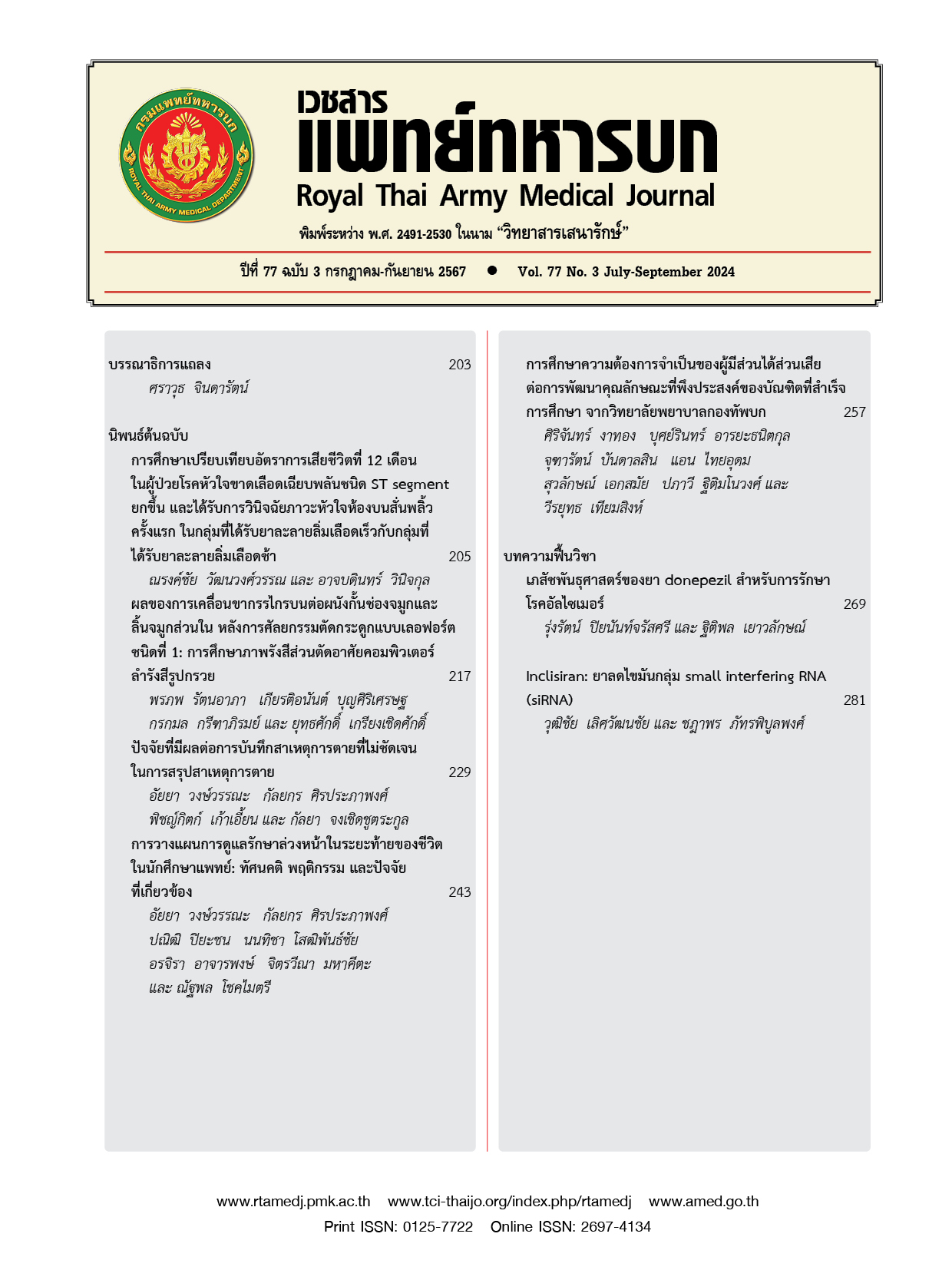การวางแผนการดูแลรักษาล่วงหน้าในระยะท้ายของชีวิต ในนักศึกษาแพทย์: ทัศนคติ พฤติกรรม และปัจจัยที่เกี่ยวข้อง
Main Article Content
บทคัดย่อ
ที่มาและความสำคัญ เพื่อพัฒนาหลักสูตรแพทยศาสตร์เรื่องการดูแลแบบประคับประคอง การวางแผนการดูแลรักษา ล่วงหน้า และปรับปรุงคุณภาพการบริการทางการแพทย์โดยยึดผู้ป่วยเป็นศูนย์กลาง การศึกษาว่านักศึกษาแพทย์มีทัศนคติ และพฤติกรรมต่อความตายอย่างไรเป็นสิ่งสำคัญ วัตถุประสงค์ เพื่อศึกษาทัศนคติ และพฤติกรรมเกี่ยวกับการวางแผนการดูแลรักษาในระยะท้ายของชีวิตล่วงหน้าในนักเรียนแพทย์ทหาร (นพท.) และนักศึกษาแพทย์ (นศพ.) วิทยาลัยแพทยศาสตร์พระมงกุฎเกล้า (วพม.) รวมไปถึงปัจจัยที่เกี่ยวข้อง วิธีการศึกษา ใช้รูปแบบการวิจัยแบบผสมผสานด้วยการเก็บข้อมูลเชิงปริมาณและสัมภาษณ์เพื่อเก็บข้อมูลเชิงคุณภาพ กลุ่มตัวอย่างคือ นพท. และ นศพ.วพม. ทุกชั้นปี จำนวน 132 คน ผลการศึกษา พบว่าอาสาสมัครมีทัศนคติที่เห็นด้วยต่อคำว่าตายดีตามคำนิยามที่ผู้วิจัยได้รวบรวมไว้ และมีทัศนคติที่เห็นด้วยกับมุมมองที่ว่าความตายเป็นเรื่องธรรมชาติ ในขณะที่มุมมองต่อความตายอื่น ๆ นั้นไปในทางที่ไม่เห็นด้วย และผลการเรียนของอาสาสมัครที่ต่ำกว่า 3.50 เป็นปัจจัยที่สัมพันธ์กับมุมมองต่อความตาย ว่าเป็นการปลดปล่อยมากกว่าอาสาสมัครที่มีผลการเรียนตั้งแต่ 3.50 ขึ้นไปอย่างมีนัยสำคัญ (p < 0.01) ข้อมูลเชิงคุณภาพจากการสัมภาษณ์อาสาสมัครจำนวน 12 ราย พบว่าระดับชั้นการศึกษา และระดับผลการเรียนอาจมีผลต่อมุมมองต่อความตาย อาสาสมัครเกือบทั้งหมดยังไม่ได้ลงมือวางแผนการดูแลรักษาระยะสุดท้ายของตนเองไว้เป็นลายลักษณ์อักษรแม้จะเห็นว่าเป็นสิ่งสำคัญ อภิปรายและสรุป จากผลการศึกษาที่พบระดับชั้นการศึกษา และระดับผลการเรียนอาจมีผลต่อมุมมองต่อความตายซึ่งเป็นปัจจัยทางจิตสังคม จึงควรมีการศึกษาเพิ่มเติมที่เน้นปัจจัยทางจิตสังคม ของนักศึกษาแพทย์ เพื่อช่วยให้การวางแผนการสอนเกี่ยวกับเรื่องการวางแผนการดูแลรักษาล่วงหน้าในหลักสูตรการแพทย์ศึกษามีความเหมาะสมแก่ผู้เรียนมากยิ่งขึ้น
Downloads
Article Details

อนุญาตภายใต้เงื่อนไข Creative Commons Attribution-NonCommercial-NoDerivatives 4.0 International License.
บทความในวารสารนี้อยู่ภายใต้ลิขสิทธิ์ของ กรมแพทย์ทหารบก และเผยแพร่ภายใต้สัญญาอนุญาต Creative Commons Attribution-NonCommercial-NoDerivatives 4.0 International (CC BY-NC-ND 4.0)
ท่านสามารถอ่านและใช้งานเพื่อวัตถุประสงค์ทางการศึกษา และทางวิชาการ เช่น การสอน การวิจัย หรือการอ้างอิง โดยต้องให้เครดิตอย่างเหมาะสมแก่ผู้เขียนและวารสาร
ห้ามใช้หรือแก้ไขบทความโดยไม่ได้รับอนุญาต
ข้อความที่ปรากฏในบทความเป็นความคิดเห็นของผู้เขียนเท่านั้น
ผู้เขียนเป็นผู้รับผิดชอบต่อเนื้อหาและความถูกต้องของบทความของตนอย่างเต็มที่
การนำบทความไปเผยแพร่ซ้ำในรูปแบบสาธารณะอื่นใด ต้องได้รับอนุญาตจากวารสาร
เอกสารอ้างอิง
National Health Commission Office. Palliative care. Bangkok: Pimdee; 2013.
Rojanaprapa V, Boondo S, Anothai S. The Application of the Postmodern Philosophical Paradigm and Buddhist Philosophy for Creating Right Wisdom Society in Thailand 4.0. Saint John’s Journal. 2019; 22(30):187-204. Thai.
Taksinawet C. Design your own funeral [internet]. 2022 [Cited 2 December 2023]. Available from : https://thematter.co/social/design-your-own-funeral/183357. Thai.
Sousa A, Marina S, Ricou M. Spiritual Beliefs and Hastened Death: A Study on Medical Students. Omega (Westport). 2022;85(2):384-408.
Asadpour M, Sabzevari L, Ekramifar A, Bidaki R. The Attitude of Medical Students Toward Death: A Cross-Sectional Study in Rafsanjan. Indian J Palliat Care. 2016;22(3):354-61.
Ngamgam S, Sangchart B. Buddhist Monks’ Perceptions Concerning Good Death [internet]. 2016 [Cited 22 April 2023]. Available from: https://gsbooks.gs.kku.ac.th/59/ingrc2016/pdf/MMO7.pdf.
Kunsongkeit W. Good Death as Perceived by the Critically Ill Patients’ Family Members. The Journal of Faculty of Nursing Burapha University. 2016;24(4):89-100. Thai.
Wong PTP, Reker GT, Gesser G. The death attitude profile–revised: A Multidimensional measure of attitudes toward death Death Attitude Profile-Revised: A multidimensional measure of attitudes toward death. In: Neimeyer RA, Editor. Death anxiety handbook: Research, instrumentation, and application [internet]. APA PsycInfo. 1994:121-48. [Cited 22 April 2023]. Available from : https://psycnet.apa.org/record/1994-97098-006
Cohen MZ, Kahn DL, Steeves RH. Hermeneutic phenomenological research: A practical guide for nurse researchers. United States: SAGE;2000.
Xiang Y, Zhang Y, Ning Z. Attitude of undergraduate nursing interns in regard to death and the influencing factors. Am J Transl Res. 2023;15(5):3616-23.
Haroen H, Mirwanti R, Agustina HR, Pahria T, Harun H, Akuoko CP, et al. A Qualitative Study of Perception and Experience Toward End-of-Life Care Among Nursing Students Who Witnessed Dying People in Their Family. J Multidiscip Healthc. 2023;16:2261-70.
Tong J, Liu Q, Liu Y, Li J, Zhang Q, Shi H. Factors influencing death attitudes of medical students: a scoping review. Front Public Health. 2024;12:1342800.
Zdziarski K, Awad MS, Landowski M, Zabielska P, Karakiewicz B. Attitudes of Palestinian and Polish Medical Students Towards Death. Omega (Westport). 2022;86(1):241-54.


